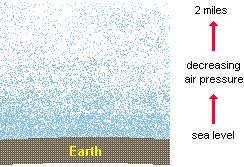How does altitude affect the human body?
2 Answers
Altitude effects the human body very much.
Explanation:
Generally we can observe that people living in the hilly areas are short. This is a type of adaptation. Altitude will even have affect on complexion of the organism
Altitude affects humans in a few ways.
Explanation:
Altitude affects humans in a few ways. Atmospheric pressure changes depending on altitude. The lower pressure found at higher altitude means humans have a harder time obtaining oxygen than they would at lower altitudes.
Image below shows relationship of pressure and distance from sea level:

At sea level, the atmospheric pressure is roughly 1 atm and oxygen makes up roughly 21% of the air. The human body is well-adapted for such conditions. Our body increases the amount of hemoglobin, the protein in our blood which binds to oxygen, in our blood when we remain at high altitudes for an extended period of time. This allows our blood to transport more oxygen.
Altitude sickness can occur if one increases altitude too quickly. Symptoms include shortness of breath, exhaustion, nausea, headaches, swelling of the face, feet, or hands, and others. A more extreme version of altitude sickness is High Altitude Pulmonary Edema (HAPE) that typically occurs at altitudes above 2,500m. Fluid accumulates in the lungs. HAPE can be fatal if not treated quickly. High Altitude Cerebral Edema (HACE), swelling of the brain, can also occur and is also fatal if not treated quickly.
Populations of humans that have lived at high elevations for extended periods of time show adaptations to higher elevations (read more here). For example, Peruvians whose ancestors have lived at high elevations for generations have more hemoglobin in their blood. Some Tibetans whose ancestors have lived at high elevations for generations have a special gene that allows them to use oxygen more efficiently (see here).


